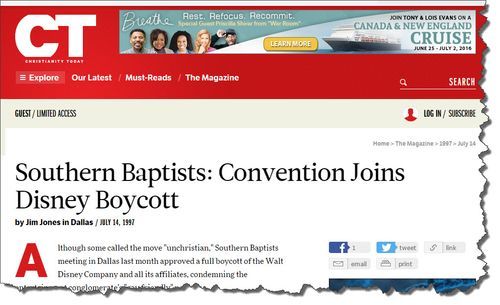Should A Christian Make Ungodly Investments?
As a Christian would you want to financially support a business involved in pornography or a major Las Vegas casino complex? These are the kinds of baited questions that are posed by those who tout so-called "morally responsible" investing. Investment screening on the basis of a political or philosophical agenda originally gained popularity among environmental activists who avoided companies with poor environmental track records (the secular phraseology in their cases is "socially responsible"). For several years now, Christians have entered into their own brand of philosophical investing, usually called "morally responsible." You can name your cause and, nowadays, there is likely a mutual fund to be found that will uniquely address it, in terms of the company stocks it chooses to include���as well as exclude���from the fund portfolio.

Unfortunately, adherence to a genuinely ���morally responsible��� position on investment selection is basically untenable. I wish that were not the case���it would be a pretty terrific (investment) world if we could both invest well and do so in a way that is truly characteristic of moral responsibility���but accomplishing that is next to impossible, when it comes right down to it.
One of the biggest problems with trying to realize a morally ���pure��� investment portfolio has to do with the complex relationships between businesses and other organizations. Here is a quick example: American Express, like most major corporations, gives money to a large number of non-profit organizations annually. Among those it has financially supported over the years is Planned Parenthood. Planned Parenthood is widely known for its "pro-choice" views, views with which I, of course, do not agree. However, should I use this as the reason to avoid investing in the stock of American Express or any mutual fund that may purchase shares of this large multi-national financial firm?
This is just one tiny example of how this problem of investment ���purity��� can evidence itself. Think of all the companies in the world that have relationships with countless numbers of other entities of all types, and then ponder if it is realistic, from an investment perspective, to be able to truly cull the morally responsible companies from those that are not.
These noted complexities exist in a variety of economic sectors, at a variety of levels: grocery store chains seem harmless enough, in one sense, but most now sell alcohol and tobacco, as well as some salacious magazine material; major media companies obviously produce all kinds of programming that is in conflict with our Christian values; book store chains (well, those that are left) carry pornographic magazines, as well as other objectionable magazines and books; the Internet is riddled with pornography and unwholesome web sites; and medical and pharmaceutical companies are involved, one way or another, with medical procedures with which we disagree.
How about banks and other lending institutions? On the surface, these kinds of businesses certainly do not appear to be engaged in morally irresponsible practices, but think more fully on this - your bank is lending money to the same businesses mentioned above. With whose money are they making these loans? Yours, if you are one of their depositors.
You see my point. We can find something objectionable in the products or practices of almost every company, in virtually every industry. If we do not have an issue with what they manufacture or sell, we may easily have one with regard to their policies, or perhaps with their choices on behalf of the charitable contributions they elect to make. Aside from all of that, we may learn that the CEO or founder has different political affiliations than we do, or has been divorced, is an atheist, or has been sexually immoral, etc.
Christians Can't Agree On What Companies To Avoid...
Take for example the firearms industry. Some Christians consider companies involved with the sale of guns and ammunition as ungodly, while others are staunch proponents of gun ownership and the 2nd Amendment. What about companies that profit from the design and sale of military grade weapons to the U.S. government? Some Christians would take the position that any company involved in profiting from military weaponry is immoral, while others believe that our country should have a strong national defense. What about the environment? Some Christians would avoid investing in any company involved with oil exploration, nuclear energy, or other activities that might hurt the environment (such as fracking), while others have a much more tempered view, and see a balance between man's needs for resources and protecting the environment. One faith based fund even goes so far as to screen out companies that offer corporate benefits to same sex partners of their employees (which is very much becoming the norm, even though as Christians we disagree).
Morally Responsible Funds and Portfolios Just Don���t Perform Terribly Well
While I do not mean to trivialize our need as Christians to stand for important values and virtuous standards, I think we must approach this matter with balance and reason. The performance results of morally or socially responsible investing are generally poor. Virtually all of the mutual funds involved in this kind of screening of investment selections have underperformed the market year in and year out. I believe the reason for this is simple: if an investment company has to spend most of its time deciding what not to invest in, it ends up having very little time or resources left to devote to finding profitable opportunities for its investors. Furthermore, these firms have to avoid so many of the best blue chip companies for the aforementioned reasons���that they stand very little chance of being able to truly compete in the investment marketplace.
By the Way���You are NOT Giving Money to a Company When You Buy Its Stock
Something else worth noting: In the vast majority of cases, when you purchase stock in a company, you are participating in what is called the "secondary market." For example, if I were to go out today and purchase a used Ford minivan, I would be participating in a secondary market of Ford vehicles. In my example, would Ford receive even $1 of my money if I purchased a used Ford van from another individual? No. Likewise, if you or I purchase shares of Disney stock through a stockbroker today, we are buying those shares from another investor and not from Disney. This means that Disney would not receive one cent of our money. The only exception to this would be if you purchased shares of a new issue of stock. Being invited to participate in an initial or secondary offering of stock is a very rare occurrence. These offerings are usually made to a firm���s largest and best customers, since they are almost always very profitable within a few hours of their issuance. The average man on the street will likely never have an opportunity to buy newly issued stock. He will end up like 99 percent of all investors, purchasing stock that has already been owned by someone else first. When you buy stock in a given company you are not giving it your money; you are simply becoming a shareholder by purchasing the interest of another investor.
The Solution: Rather than Limiting Your Investments to Companies That Espouse 100 Percent of Your Values, Try Something Like My ���80/20 Principle���
We Christians know that even within our various denominations there are profound disagreements about significant issues of our faith. How then can we expect a secular company to reflect our Christian values? Follow my 80/20 principle to arrive at a reasonable balance with this issue.
Even though I know that, in almost every case, my money is not going to actually "support" companies in which I buy stock, I still try to avoid any unnecessary associations with overtly objectionable businesses. Although this is not a scientific approach, I will generally read several analysts reports on the company I am considering investing in and apply my personal 80/20 principle. This principle simply asks, "Is the company doing business with more than 20 percent of its focus in areas objectionable to my beliefs and values?" This means that even though Kroger (a grocery store chain) sells alcohol and tobacco, it is not the main focus of its business. I would still consider buying its stock. It also means that since a company like Playboy Enterprises (no longer publicly traded) which focuses virtually all of its business activities on pornography, I would pass on the stock regardless of how "profitable" it looked. I would pass on casinos and gaming companies as well. I could still buy stocks like Disney, AT&T, General Electric, as well as those of most Internet businesses and media companies (note that I am not recommending any of the aforementioned companies; I am only pointing out that I personally feel comfortable as a Christian purchasing these stocks since I have concluded that no more than 20 percent of their business activities are inconsistent with my values and beliefs). This kind of common sense screening is fairly easy to apply if you are buying individual stocks.
Additionally, in my capacity as an actual shareholder, I can try to effect change within the company by writing letters to the board of directors. I can assure you that this carries much more weight than being just a member of the general public.
Ultimately, this is an area that is highly personal. I do not believe that it is my place to act as your conscience and advise you on a stock-by-stock basis about which stocks could be ethical to invest in. However, I do suggest that if a morally responsible outlook is important to you when it comes to investing, approach the task on a ���best efforts��� basis, rather than dogmatically; try to avoid being overly ���legalistic��� about this issue, and seek to exclude from your consideration only those companies that are blatantly in contradiction with your moral views.
Helping you make the most of God's money!
James L. Paris
Editor-In-Chief ChristianMoney.com
Follow Me on Twitter Twitter.com/jameslparis
Christian Financial Advice
Jim Paris 24 Hour Radio






